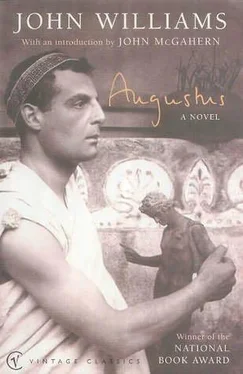John Williams - Augustus
Здесь есть возможность читать онлайн «John Williams - Augustus» весь текст электронной книги совершенно бесплатно (целиком полную версию без сокращений). В некоторых случаях можно слушать аудио, скачать через торрент в формате fb2 и присутствует краткое содержание. Жанр: Историческая проза, на английском языке. Описание произведения, (предисловие) а так же отзывы посетителей доступны на портале библиотеки ЛибКат.
- Название:Augustus
- Автор:
- Жанр:
- Год:неизвестен
- ISBN:нет данных
- Рейтинг книги:3 / 5. Голосов: 1
-
Избранное:Добавить в избранное
- Отзывы:
-
Ваша оценка:
- 60
- 1
- 2
- 3
- 4
- 5
Augustus: краткое содержание, описание и аннотация
Предлагаем к чтению аннотацию, описание, краткое содержание или предисловие (зависит от того, что написал сам автор книги «Augustus»). Если вы не нашли необходимую информацию о книге — напишите в комментариях, мы постараемся отыскать её.
Augustus — читать онлайн бесплатно полную книгу (весь текст) целиком
Ниже представлен текст книги, разбитый по страницам. Система сохранения места последней прочитанной страницы, позволяет с удобством читать онлайн бесплатно книгу «Augustus», без необходимости каждый раз заново искать на чём Вы остановились. Поставьте закладку, и сможете в любой момент перейти на страницу, на которой закончили чтение.
Интервал:
Закладка:
If I have allowed the Greeks to pretend to themselves that I am the revived Bacchus (or do you prefer Dionysus: ^ 1), it is so that their love for me will give me some control over them. You criticize me for "playing the Greek" and for assuming the role of the Incarnate Bacchus at the Festival of Athena; and yet you must know that when I agreed to do so, I insisted that the Celestial Athena bring me a dowry-and that by that insistence, I have enriched our treasury by more than I could have done by levying taxes, and have also escaped the resentment that would have inevitably resulted from such a levy.
As for the Egyptian matters that you so delicately raise: first, it is true that I have accepted certain of the Queen's subjects as my aides. This is both helpful to my task, and necessary to my diplomacy. But even if all this were merely for my own pleasure, I see no reason why you should object: Ammonius you know yourself, for he was a friend of your late uncle (or "father," as you now may call him)-and he serves me as faithfully as he served Julius and as he served his Queen. As for Epimachos, whom you call a mere "soothsayer," such a designation reveals (if you will forgive me) a profound ignorance about these Eastern matters. This "mere soothsayer" is an extraordinarily important man: he is the High Priest of Heliopolis, the Incarnation of Thoth, and the Keeper of the Book of Magic. He is a good deal more important than any of our own "priests," and he is useful to me; and besides, he is an amusing fellow.
Second, there was never any secret about my connection with the Queen two years ago in Alexandria. But I recall to you that that was two years ago, before either of us had any notion that I might one day become your brother-in-law. And you need not bring up the matter of the twins with which Cleopatra has presented me; they may or may not be my own; whether they are or not is no matter. I have not made secret, either, that I have left children all over the world; these new ones would mean neither more nor less to me than the others. When I have time from my duties, I take my pleasure, and I take it where I can find it. I shall continue to do so. At least, my dear brother, I do not hide my propensities; I am no hypocrite; and your own affairs, I should point out, are not so well hidden as you imagine.
You should know me better than to think (if, indeed, you do think it, as you pretend) that my liaison with Cleopatra had anything to do with my confirmation of her sovereignty in Egypt. For if this confirmation is to my advantage, so it is to yours. Egypt is the richest of the Eastern nations, and its treasury will be open to us, if we need it. And it is the only Eastern nation that has any semblance of an army, and at least a part of this army will be at our disposal. Finally, it is easier to deal with a single strong monarch who feels some security in his (or her) position than with half a dozen weak ones who feel none.
These things, and many others, should be clear to you, who are no fool.
I will not accept the terms of whatever game it is you think you are playing.
II Letter: Marcus Antonius to Gaius Sentius Tavus (38 B. c.)
That bloody and outrageous little hypocrite! I am stretched between laughter and anger-laughter at the hypocrisy, and anger at what his hypocrisy might conceal.
Does he imagine that I am without my sources of information here in Athens? I am not shocked by anything he does, and I do not take that high moral tone that he loves to affect. He may divorce as many a Scribonia as he likes, even on the day that she gives birth to a daughter that (given Scribonia) must be his; he may even take within the week another wife, who is already pregnant by her former husband. He may perform this public scandal (and even the more private ones that you report to me), and he will get no remonstrances from me; he may be as bizarre as he likes in his private preferences.
But I know my recent "brother;” and I know that he does nothing from passion or whim. He is such a cold-blooded fish that I must almost admire him.
It must be clear to everyone that his divorce of Scribonia signifies that we no longer have an understanding with her kinsman, Sextus Pompeius. What can I make of this? Why was I not consulted? Does it mean that we are to make war on Sextus? Or will Octavius go it alone?
And what of his new wife, this Li via? You tell me that Octavius once exiled her husband from Italy, because he was a Republican and opposed him at Perusia. Does the new marriage mean that he is again trying to find favor with the remnants of the Republican Party? I do not know what all of this means… You must write often, Sentius; I must be kept informed, and I can trust few, nowadays. I wish I were in Rome; but I cannot leave my task here.
I have been trying to persuade myself that the kind of life I am now leading is worth the trouble. My present wife is as cold and proper in fact as her brother is in pretense. And though I can find my pleasure here and there, I have to be so discreet that the pleasure is reduced almost to nothing. Daily, I am tempted to send her packing; but I have no cause, she is with child, and to divorce her now would cause a breach with her brother that I cannot afford.
III. Extracts from Reports: Epimachos, High Priest of Heliopolis, to Cleopatra, the Incarnate Isis and Queen of the Worlds of Egypt (40-37 B.C.)
Greetings, Revered Queen. This day, at first for amusement and then from desperation, Marcus Antonius diced with Octavius Caesar. For nearly three hours they played, and Antonius lost consistently, winning perhaps one out of four throws. Octavius is well pleased, Antonius annoyed. I cast the sands, and went into a trance, from which I told the story of Eurystheus and that Heracles who became his servant because of the perfidy of the gods. Suggest that in your next letter to him, you refer to some demeaning task you dreamed he had to perform for someone weaker and less worthy than himself. I was grave and portentous; you must be humorous and light.
My auguries have been to no avail; he is married to Octavia, the sister of his enemy. It is the pledge that will satisfy the populace and the soldiers.
I send you two waxen effigies. You are to find in your palace a remote room which has but one door. You are to place the effigy of Antonius on the side of the room where there is a door, the effigy of Octavia on the side where there is none. You are to do this with your own hands; let no one assist you. Then you are to have built between the figures a heavy wall, extending from the floor to the ceiling; there must be no fissure between the two. Each day, at sun's rising and sun's setting, you are to have my priest, Epiktetas, perform the spell outside the room. He will know what to do.
We go to Athens with Octavia, who is now with child and will deliver within three months. I have presented to Antonius a pair of identical greyhounds, which he has raced and of which he has become inordinately fond. On the day that Octavia's child is born, I shall cause the dogs to disappear. You must write him within the next few weeks of a dream that you had about the twins.
The child that Octavia has delivered is a daughter; thus there is no potential heir to his name. The God of the Sun has bowed to our will and has heeded our demands.
He quarrels with Octavius; they are reconciled by Octavia, who takes the part of her husband against her brother. Antonius's suspicions of her are almost gone, and he seems grudgingly fond of her, though he is still made impatient by her quietness and calm. Does Epiktetas perform faithfully the spell, as you instructed him?
He has had a dream of being bound to a couch while his tent burned around him. The soldiers of his army walked past the burning tent, and did not heed his calls, as if they did not hear him. Finally he burst his bonds, but the fire was around him so fiercely that he could not see which way to turn to escape. He awoke in fear, and called for me.
Читать дальшеИнтервал:
Закладка:
Похожие книги на «Augustus»
Представляем Вашему вниманию похожие книги на «Augustus» списком для выбора. Мы отобрали схожую по названию и смыслу литературу в надежде предоставить читателям больше вариантов отыскать новые, интересные, ещё непрочитанные произведения.
Обсуждение, отзывы о книге «Augustus» и просто собственные мнения читателей. Оставьте ваши комментарии, напишите, что Вы думаете о произведении, его смысле или главных героях. Укажите что конкретно понравилось, а что нет, и почему Вы так считаете.











